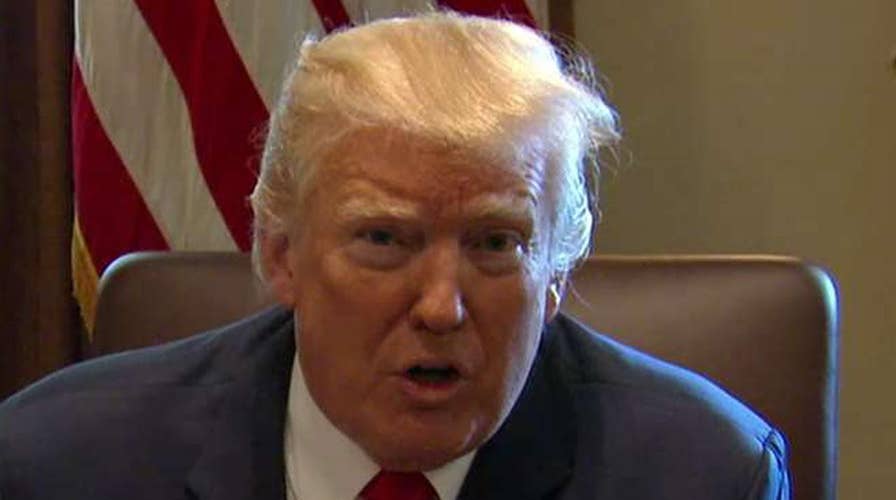Trump: John Kelly will be a superb chief of staff
President addresses first Cabinet meeting with new chief of staff
Retired general John Kelly took command Monday of President Trump's White House staff, in a shakeup that could serve to restore discipline and focus to a White House that’s been gripped by internal power struggles that have played out in the press.
Kelly’s reputation as a straight shooter has many in the Oval Office and Republican Party optimistic as he takes the reins as chief of staff. They see Kelly, who had led the Department of Homeland Security, as the ideal candidate to dial back the drama that’s plagued the White House in recent weeks.
“He will do a spectacular job, I have no doubt, as chief of staff,” Trump said minutes after Kelly was sworn in Monday morning. “What he’s done, in terms of homeland security, is record shattering. You look at the border, you look at the tremendous results we’ve had and you look at the spirit. And with a very controversial situation, there has been very little controversy which is pretty amazing by itself.”
Trump, though, earlier Monday downplayed the palace intrigue behind the selection and said his White House is not in "chaos."
“Highest Stock Market EVER, best economic numbers in years, unemployment lowest in 17 years, wages rising, border secure, S.C.: No WH chaos!” he tweeted.
Republicans hope Kelly can at least serve to reduce the tensions in the West Wing.
“He’s going to have to reduce the drama, reduce both the sniping within and reduce the leaks, and bring some discipline to the relationships,” Republican strategist Karl Rove, said on “Fox News Sunday.”
Kelly's appointment as chief of staff was announced Friday.
The Homeland Security secretary and retired Marine Corps general takes over for Reince Priebus, whose management style was seen as a far cry from Kelly's. Leading up to the appointment was a series of nasty internal battles, details of which frequently leaked to the press, creating another distraction for a team struggling to notch any significant legislative achievement.
'He's going to have to reduce the drama, reduce both the sniping within and reduce the leaks, and bring some discipline to the relationships.'
The tensions escalated further more than a week ago, when White House Press Secretary Sean Spicer resigned after six months on the job, in protest over the hiring of Wall Street financier Anthony Scaramucci as the new communications director.
Scaramucci made headlines almost immediately after a conversation he had with a reporter from The New Yorker was printed in full. In that conversation, Scaramucci went on an expletive-laced rant about Priebus and Steve Bannon, Trump’s chief strategist, both of whom purportedly opposed his hiring.
In his call, Scaramucci vowed to get Priebus canned and threatened to fire the White House communication staff one by one.
In addition to strain in the West Wing and with Congress, Kelly starts his new job as tensions escalate with North Korea. The United States flew two supersonic bombers over the Korean Peninsula on Sunday in a show of force against North Korea, following the country's latest intercontinental ballistic missile test. The U.S. also said it conducted a successful test of a missile defense system located in Alaska.
Sen. Dianne Feinstein, D-Calif., said on CBS' "Face the Nation" that she hopes Kelly can "be effective," and "begin some very serious negotiation with the North and stop this program."
Another diplomatic fissure opened Sunday when Russian President Vladimir Putin said the U.S. would have to cut its embassy and consulate staff in Russia by several hundred under new sanctions from Moscow. In a television interview, Putin indicated the cutback was retaliation for new sanctions in a bill passed by Congress and sent to Trump.
Trump plans to sign the measure into law, the White House has said. After Putin's remarks, the State Department deemed the cutbacks "a regrettable and uncalled for act" and said officials would assess the impact and how to respond to it.
While Trump is trying to refresh his team, he signaled that he does not want to give up the fight on health care. On Twitter Sunday, he said: "Don't give up Republican Senators, the World is watching: Repeal & Replace."
The protracted health care fight has slowed Trump's other policy goals, including a tax overhaul and infrastructure investment. But Trump aides made clear that the president still wanted to see action on health care. White House budget director Mick Mulvaney said on CNN's "State of the Union," that senators "need to stay, they need to work, they need to pass something."
Asked if nothing should be voted on in Congress until the Senate votes again on health care, Mulvaney said: "Well, think -- yes. And I think what you're seeing there is the president simply reflecting the mood of the people."
On Saturday, Trump threatened to end required payments to insurance companies unless lawmakers repeal and replace the Obama-era health care law. He tweeted that if "a new HealthCare Bill is not approved quickly, BAILOUTS for Insurance Companies and BAILOUTS for Members of Congress will end very soon!”
The payments reduce deductibles and co-payments for consumers with modest incomes. Trump has guaranteed the payments through July, but has not made a commitment going forward.
White House counselor Kellyanne Conway said on "Fox News Sunday" that Trump would make a decision on the payments this week.
The House has begun a five-week recess, while the Senate is scheduled to work two more weeks before a summer break.
The Associated Press contributed to this report.

























